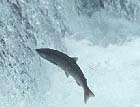North Atlantic salmon in decline
New research shows that climate change is forcing salmon to head northwards, away from England’s rivers


There are parts of the British Isles that are treasured for their salmon fishing credentials. Rivers like the Wye, the Test and the Frome are synonymous with seasoned anglers, and spectacles such as the salmon leaping up the Falls of Shin in Scotland are an undeniably impressive sight. Now the North Atlantic Salmon Fund has found that in the last 30 years, salmon populations in the UK have fallen by a worrying 70%.
It is not only the spectacle and the sport that will be affected if this decline is allowed to continue, but also the local economy and biodiversity of areas surrounding key salmon fishing rivers in Britain. The Government has funded a study to investigate the effect of climate change on the fish, which employs the same technology that was previously used to study dinosaur remains, and possible life on Mars.
The study is taking place at the National Oceanographic Centre (NOC) in Southampton, and will analyse the chemical composition of the salmon’s scales. From this, it will be possible to tell what the salmon in question have eaten and whether they were in a productive part of the ocean at the time. The leader of the project, Dr. Clive Trueman wanted the study to provide a greater understanding of the link between the fish and climate. ‘There's a hypothesis that the numbers of salmon fluctuating with climate is to do with plankton abundance, and therefore if the plankton are changing their distribution as a result of climate change then we would predict that that would impact on the salmon population.’
The decline of salmon in Britain is not a new phenomenon; they first disappeared from the Thames in 1821 and have been reported as waning all over the UK, on a regular basis. Orri Vigfusson, the Chairman of the fund said that ‘salmon are having to travel longer distances in order to get farther north, to maintain their traditional migration pattern and way of life.’
‘If the trend continues, grilse (young salmon) in the UK and Europe may become a thing of the past and we should investigate how this was allowed to happen and who is responsible.’
For more information about the North Atlantic Salmon Fund, go to www.nasfworldwide.com
To comment on this article, use the comment box below, or email us at clonews@ipcmedia.com. Read more about the countryside.
Exquisite houses, the beauty of Nature, and how to get the most from your life, straight to your inbox.
Country Life is unlike any other magazine: the only glossy weekly on the newsstand and the only magazine that has been guest-edited by His Majesty The King not once, but twice. It is a celebration of modern rural life and all its diverse joys and pleasures — that was first published in Queen Victoria's Diamond Jubilee year. Our eclectic mixture of witty and informative content — from the most up-to-date property news and commentary and a coveted glimpse inside some of the UK's best houses and gardens, to gardening, the arts and interior design, written by experts in their field — still cannot be found in print or online, anywhere else.
